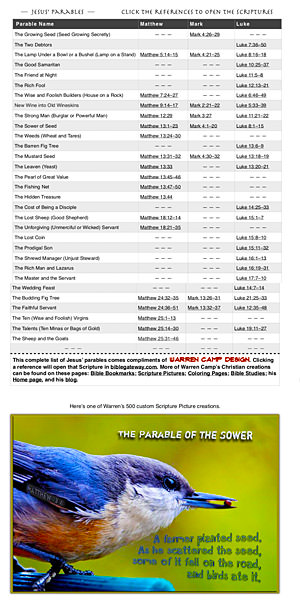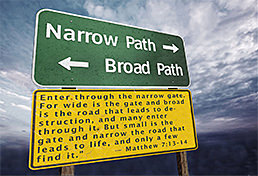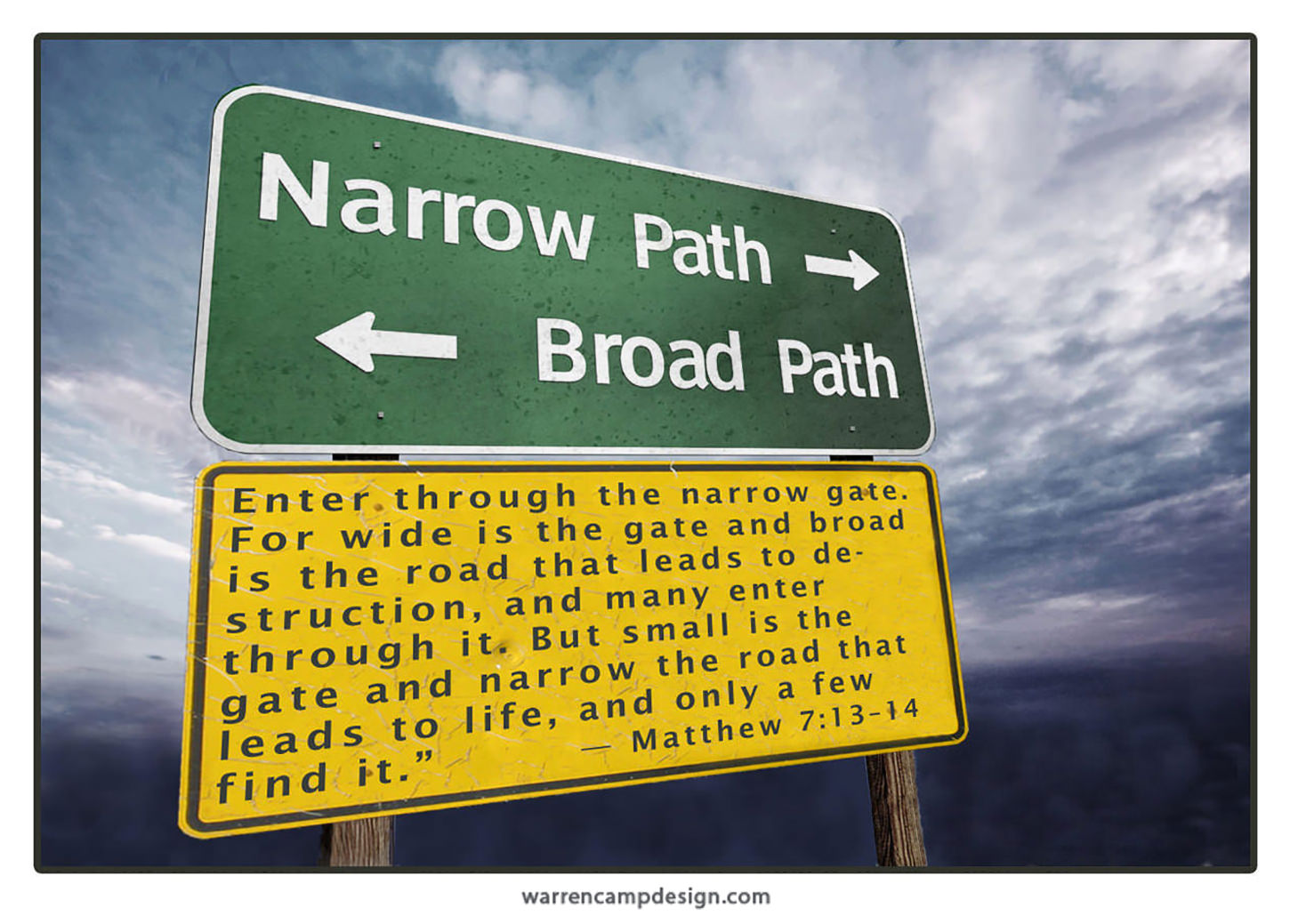This parable is portrayed differently in Matthew's and Luke's gospels, yet both provide the essential importance and truth that Jesus was presenting to the Israelites in his day and to us today.
Be sure to read both commentaries so you can appreciate the differences and similarities of each.
— Preview —
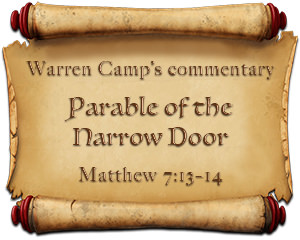

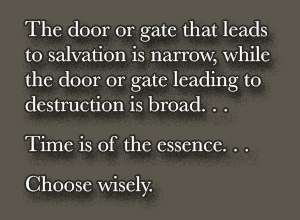
Click the list or the “bird” to enlarge and use Warren’s list of forty-four of Jesus’ parables (a PDF file with links to Scriptures).
par•a•ble [noun] a simple story used to illustrate the meaning of or a moral or spiritual lesson, as told by Jesus in the gospels
synonyms: allegory, moral story/tale, fable
Jesus’ Parable of the Narrow Door
Matthew 7:13–14; Luke 13:22–30
As Jesus was concluding his Sermon on the Mount, he used an illustration meant to call his listeners, readers, and us today, to respond. Throughout that sermon, Jesus brought out the nature of true righteousness in contrast to self-righteousness, as seen in the scribes and Pharisees. As Jesus brought his sermon to its conclusion in Matthew 7, he used an illustration to call people to respond appropriately. Today, we have a choice between two gates: Each opens and gives us access to a different way of life, which ultimately leads to two different, final destinations.
Jesus commanded his listeners, and us, to enter and pass through a narrow door (or gate, or road, or path). It’s that narrow option that he told everyone to take. The reason that that’s the better choice is that it leads to life. Otherwise, if we don’t obey his command and enter through the proper door, we’ll go through the wrong door, offering dire consequences. There’s no third option; we must choose the narrow door or the wide one.
Both gospel passages (shown below) likely cause many to question God’s good intentions for mankind. After all, if he really wants to save everyone, why doesn’t he make it easy to be saved? Why doesn’t he simply let everyone into heaven without difficulty or challenge? Below the video, I’ll provide you with a clear explanation of God’s apparent purpose of having people choose to enter the narrower of entrances, which is more difficult to access.
Compliments of illBeHonest.com
The Parable of the Narrow Door
(Narrow and Wide Gates, or Roads, or Paths)
Luke’s Account, First
Because Luke’s presentation of this parable is longer and more faceted, I’ll start with its reference, then follow with Matthew’s two-verse rendition while dovetailing highlights of both gospel accounts, here and there.
The Narrow Door
22Then Jesus went through the towns and villages, teaching as he made his way to Jerusalem 23Someone asked him, “Lord, are only a few people going to be saved?”
He said to them, 24“Make every effort to enter through the narrow door, because many, I tell you, will try to enter and will not be able to. 25Once the owner of the house gets up and closes the door, you will stand outside knocking and pleading, ‘Sir, open the door for us.’
“But he will answer, ‘I don’t know you or where you come from.’
26“Then you will say, ‘We ate and drank with you, and you taught in our streets.’
27“But he will reply, ‘I don’t know you or where you come from. Away from me, all you evildoers!’
28“There will be weeping there, and gnashing of teeth, when you see Abraham, Isaac and Jacob and all the prophets in the kingdom of God, but you yourselves thrown out. 29People will come from east and west and north and south, and will take their places at the feast in the kingdom of God. 30Indeed there are those who are last who will be first, and first who will be last” (Luke 13:22–30).
Luke’s reference to Jerusalem is neither incidental nor accidental. His passage begins and ends with Jerusalem, where Jesus would die. His eyes were constantly set on the Holy City. It was his ultimate destiny, as he moved through the towns and villages of the Judaean Hills, towards that City of the Temple, the center of first-century Judaism.
How Many Will Be Saved? That’s what someone asked him en route to Jerusalem. In his response, he directed his words toward Israel. The pointed question was raised by one man, but our Lord’s answer was directed toward a broader group (“them,” v. 23b). The word “you” is frequently found in vv. 24–28; its context makes it evident that the “you” is Israel, and that he was speaking to the Israelites.
In all of his writing, Luke provides extensive details that are often unexpected. In this passage, he seems to deliberately avoid telling us who the inquiring man was, what group he may have represented, and what his motive might have been for asking the question. Whatever the man’s motive, the question provided Jesus with an occasion to teach his audience an important lesson.
We hear the same question of "how many people will be saved?" debated today. We can only learn the correct answer when we listen to Jesus’ response. He gives us an authoritative answer, though it’s not a direct one. Instead of answering Yes or No, he characteristically tells a story, his parable. In it, he warned that many who attempted to be saved would try to enter after it was too late to gain entrance.
Strive to Enter The door that one was to strive to enter was and is narrow. The “narrowness” of the door suggests several important lessons. If the door is narrow, then few will pass through it and it must be passed through one at a time. The Israelites believed that, since they were descendants of Abraham, they were assured a place in the kingdom, something that John the Baptist strongly refuted (Luke 3:7–8). Since the door that led to salvation was narrow, and the gate leading to destruction was broad, one would certainly not haphazardly attempt to enter into the kingdom of God; one would have to strive to enter in. Just as one in a rapidly moving current has to strive to swim upstream, so the Israelites had to strive to enter into the kingdom, contrary to the perceived mainstream approach of the Israelites.
For us, we see in vv. 24–25a that the door to God’s kingdom is also narrow. Jesus is the only way to access God; he’s the narrow doorway through which we’re to enter. There’ll be no casual entry when we’re ready. We must make a concerted effort to make that critical decision in a timely manner. This is urgent. We CANNOT FAIL to arrive at this appointment on time!
Trying, But Being Unable to Enter Jesus says, “Many, I tell you, will try to enter and will not be able to” (v. 24). Why can’t they get in? Is the way barred? . . . No, but we know from Jesus’ other parables that entry into the kingdom of God requires repentance and change. Many long to gain this goal: the inheritance of God’s kingdom, heaven, for all of time. They’ll make that concerted effort, so long as it costs them nothing, especially their allegiance and obedience. Alas, when they try to enter and learn the cost of admission, they don’t succeed in their efforts.
Add to this the fact that those who’d tried the first time but failed to enter, came again, saw the door closed, and began pounding on it (vv. 25–27). They knocked hard and continually, then they pleaded, but to no avail.
Time Is of the Essence Next, Jesus refers to a great eschatological (referring to the end times) banquet. Notice that it’s a banquet “for all peoples,” not just Jews, but also the non-Jewish Gentiles — virtually everyone around the world. When Jesus was asked, “How many will be saved?” he warned that many would try to enter the narrow door to heaven, but they’d try only after it was too late. Time was a critical element for the Israelites then, as it is for us today.
The door through which the Israelites were urged to pass was soon to close. It wasn’t only the “narrowness” of the door that posed a problem for the Israelites, but the “closure” of the door. The width of any door doesn’t matter when that door remains closed. When Jesus spoke his parable to the Israelites, the door to God’s kingdom was still open to them but was narrow. It would soon close and remain closed. While time was running out for our Lord, it was likewise running out for Israel. They had to act and needed to act quickly.
The Final Offer The doorway through which the Israelites didn’t enter, was the one that, in the future, they’d want to enter but be prevented from entering. It was Jesus’ final offer that wouldn’t last long. He taught that there’d be a time when the Israelites would want to enter the door but be unable to do so. It was one thing to have been barred by a door that one never wanted to pass through; it was vastly different for those who eventually chose to pass through that door, albeit too late, only to find it permanently shut.
The question that someone asked Jesus — “Lord, are only a few people going to be saved?” — afforded Jesus an opportunity to underscore the identical message that has marked this phase of his ministry: the time was short for Israel to repent and receive him as Messiah and Savior. Israel was to strive to enter God’s kingdom through the narrow door, not because men must work hard for their salvation but because the time for Israel was short. Much was to be gained or lost. Israel shouldn’t have been apathetic, passive, or even philosophical about Jesus and his ministry, as the question of the man in the crowd seems to suggest. Their time was short and Israel had to soon pursue salvation as something that was to be gained or lost in the person of Christ.
The man who asked Jesus the question seems to have assumed that he was among the “few” who were being saved. He may, like his fellow Israelites, have thought that the “few” being saved were Israelites while the “many” who weren’t being saved were Gentiles. Jesus has some very distressing words for those who’d think such thoughts today. In vv. 24–30, Jesus showed his audience that the Israelites weren’t prominent among the “few” who were being saved.
Shock and Awe Jesus first shocked his listeners by indicating that they weren’t already on the inside, so far as the kingdom was concerned. Then, he went on to say that many of his fellow-Israelites who weren’t already on the inside would never enter the kingdom. He told them in symbolic terms, twice (vv. 25, 27), that God would finally tell his people, Israel, that he didn’t even know from where they came.
The final blow of this parable was yet to come. Not only was association with Israel or with Jesus not enough to gain entrance, and not only were many Israelites unable to be among the “few” who were to be saved, but many of those who were saved were non-Jews, not Jews! Jesus made that reality crystal clear in vv. 28–30.
Notice that the Israelites who missed out on the kingdom by failing to pass through the “narrow” gate became very conscious of what they’d lost and what others had gained. This was the basis for the great torment they’d endure of “weeping and gnashing of teeth” (v. 28). Hell has no joy; it becomes constant, eternal torment. Hell is when and where you’ve become separated from God, wishing unendingly that you weren't, knowing that you could have followed and chosen Jesus as Lord but you refused, and realizing that you'll forever watch others enjoy their heavenly feast with Jesus.
In the Old Testament, God’s covenant with Abraham included the blessing of the Gentiles (cf. Genesis 12:1–3). Old Testament prophets also spoke of the blessing of the non-Jewish Gentiles. But when Jesus spoke of this, it sent his audience into a frenzy of opposition (Luke 4:16–30). Many who were first — the Jews, in the minds of an Israelite — Jesus said, would be last and left out, while many Gentiles – those considered “last” by Jews — would be first. They’d be the ones who’d enjoy the blessings of God in the kingdom for the rest of time (13:30).
How sad was Israel’s response to God rejecting them from his kingdom. Having read this passage from Luke’s gospel, you ought to also sense Jesus’ sadness: a sadness that only a few will be saved; a sadness that many will never enter the door; a sadness that many of his people will be excluded from the feast in heaven; and a sadness that Jerusalem resisted his love and desire to gather them to the Father. But even in his sadness, his disciples were learning from him (his early disciples and certainly we latter-day disciples). I invite you to reread Luke’s portrayal of this parable, before delving into Jesus’ words in Matthew’s gospel, below. You’ll better understand and appreciate Lord Jesus’ values, as well as his heart.
Matthew’s Account
The Narrow and Wide Gates
13“Enter through the narrow gate. For wide is the gate and broad is the road that leads to destruction, and many enter through it. 14But small is the gate and narrow the road that leads to life, and only a few find it.
The Lord Jesus refers to the narrow gate in vv. 13–14 of Matthew’s gospel, and in v. 23 of Luke’s account, shown above. He compares the narrow gate to the “broad” road or path that leads to destruction (hell). And he states that “many” will choose that broad road. Immediately, in v. 14, he says contrastingly that “small is the gate and narrow the road that leads to life, and only a few find it.” What exactly does he mean in those two verses? How might we quantify the “many” and the “few”?
The gate is considered small because God the Son is the only resource that can reconcile fallen man and Father God, through the power of the Holy Spirit. However, Scripture also says that believers from every people, nation, and societal rank can enter heaven and will bow before the King of Kings, worshiping together around his throne (Revelation 5:9). This phenominal image of contrast and unity includes everyone in God’s beautifully diverse community of believers.
Though we’re separated from God by our sin, every person whom God created is invited to enter eternity in heaven by walking this narrow path of reconciliation through a personal relationship with Christ. His sacrifice on the cross, resurrection from the tomb, and ascension to heaven is the good news, accessible to all and worth sharing, day after day.
The word “life” in v. 14 refers to “heaven.” The gate to heaven is “narrow” in the sense of having a particular requirement for entrance or admission: faith in Jesus Christ. Salvation is found only in the person of Jesus (Acts 4:12); he’s the only way we can be granted eternal life in heaven. The “wide” gate is non-exclusive; it allows for human effort and every one of this world’s religions to access it. It’s that “wide” gate or “broad” path that leads instead to destruction.
It’s essential to first realize that when Jesus mentions “gate,” “road,” “door,” or “path,” he’s referring to each of them being himself. It’s through Jesus only that we’re permitted to enter and receive eternal life in heaven, when we become saved. Apostle John teaches us that there’s no other way into heaven because Christ alone is “the way and the truth and the life” and “No one comes to the Father except through me” (John 14:6b). There’s only one route to take to reach eternal life: Jesus is that one avenue. As a result, access to salvation is narrow because there’s only one way to reach it. Sadly, relatively few people will go through the narrow gate; many more will attempt to find an alternative route to God, an easy-access thoroughfare that’s wider, broader, and seemingly much more accessible. They’ll try to get there through man-made rules and regulations, and/or self-effort.
While “many” will follow the “broad” road that leads to eternal destruction, the few (sheep) who hear the voice of the Good Shepherd and follow him by entering the “narrow” sheep gate will rest assured that they’ll be the ones who’ll be saved; they’ll surely benefit by receiving eternal life with Christ (John 10:7–11). While there will be relatively few who go through the “narrow” gate, compared to the many who’ll access the “broad” road or path, multitudes will follow the Good Shepherd and meet him personally.
Realize the Greek Usage Herein It’s important to appreciate the language that was used in this parable. In Luke 13:24, the Greek for “Make every effort” (NIV) and “Strive” (NKJV and NASB) is agonidzo, a word that refers to “a struggle, a fight, a great exertion,” or “effort.” It’s where we get the word “agony.” Entering the narrow gate won’t be easy. Jesus made this clear when he instructed his followers to “strive” to do so. The implication here is that those who seek to enter the “narrow” gate must do so through considerable effort, struggle, and strain, like a running athlete straining to reach and pass the finish line, all muscles taut, giving his all in the effort. Agonidzo itself comes from the word agon, which is the word that depicted the “athletic conflicts and competitions” that were so famous in the ancient world.
Realize too that, throughout the gospels, we’re told that it will be difficult for us to follow Christ. With a huge number of people crowding around to hear Jesus’ every word, he often gave examples, not of how easy it would be to follow him, but how heavy the obligation of becoming a Christian would be. Here are a few of his reminders, in no particular order: “hate those closest to you,” “endure trials,” “count the cost,” “consider your resources,” “forsake all.”
Make no mistake about the Lord telling you to “make every effort to enter through the narrow door.” Absolutely no amount of effort can or will save any of us! Salvation is granted followers only by the grace of God, through the gift of faith (Ephesians 2:8–9). No one will ever earn a place in heaven by striving for it. Nevertheless, entering the “narrow” gate is still difficult because of the opposition of human pride, our natural love of sin, and the opposition of Satan and the world in his control, all of which battle against us in our pursuit of eternity in heaven with Lord Jesus.

Thankfully, God offers salvation to everyone who accepts salvation on his terms only! We must choose the way that he’s provided. We can’t create our own pathway to a holy God by our own preferences and efforts. Before Christ’s crucifixion and resurrection from death, access to God and his heavenly kingdom was completely closed — it was off limits. Our continual sinfulness was the roadblock we faced. All of us deserve to remain on the “wide road that leads to destruction.” However, through Father God’s great love for his children, and his provision of grace in our lives, he now provides a direct route to Jesus, in heaven, for all time.
God also knows very well that, in our self-centered, sin-saturated world, there aren’t many who’ll desire Jesus enough to choose to approach him as their Lord . . . on his terms, albeit through the “narrow” door, gate, road, or path.
Today, most people allow their passions and desires to dictate the course of their lives. They choose temporary, earthly pleasure over the self-sacrifice that’s required to follow Jesus. Many ignore the narrow gate because of their ignorance and reluctance. Jesus declared that the road to eternal life is indeed “narrow, and only a few find it” (Matthew 7:14).
In Luke’s version of this parable, Jesus is contrasting “true righteousness” with “self-righteousness,” which is the theme, all the way through Matthew’s account of Jesus’ Sermon on the Mount.
A Hearty Way to Apply This Parable Today
Which Door, Gate, Road, Pathway Will You Choose?
So why would anyone choose the narrow gate, symbolizing the way Christians must live, when it’s such a difficult path when compared to the smooth, easy way of the world? . . . Because there are often adventures, thrills, and vistas available only to those who take the difficult “narrow” path. Undertaking the difficult way brings rewards that those who remain parked on Smooth-and-Easy Street will never know!
Jesus says in Matthew 7:13: “Enter through the narrow gate.” He wasn’t making an appeal or giving a suggestion. It was his command! Those who love Christ will obey his commands (John 14:21), and those that don’t will stay on the “broad” way that leads to eternal misery.
When Jesus was asked, “How many will be saved?” he warned that many would try to enter the narrow door to heaven, only after it was too late. So, ask yourself: “Am I already living in God’s kingdom, or am I still pondering which gate or door to access?”
Someone asked him, “Lord, are only a few people going to be saved?” (Luke 13:23)


